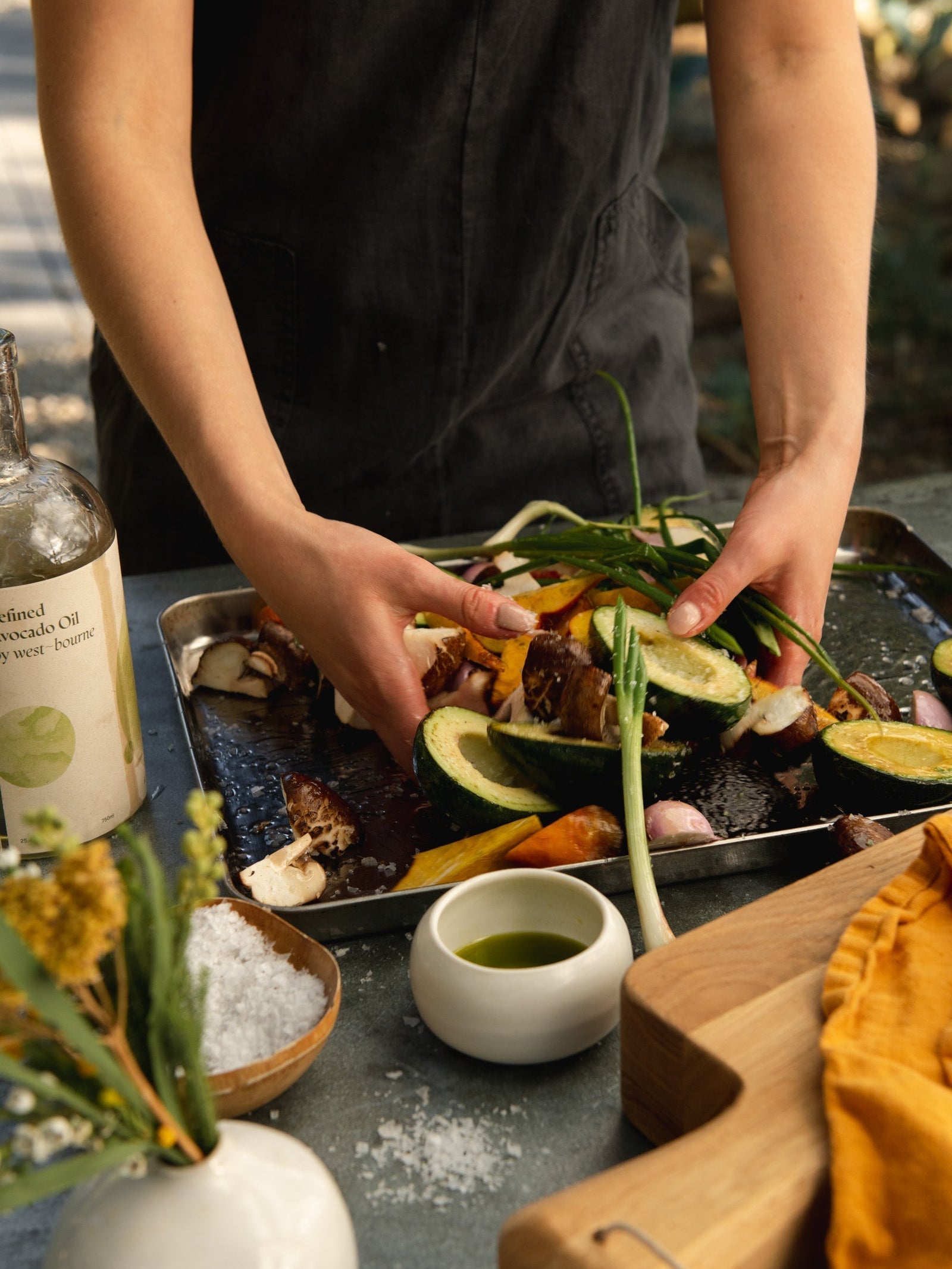5 Simple, Regenerative-Forward Kitchen Swaps
Small shifts in our everyday behavior to better support regenerative agriculture.

If there's one place to extract a good dose of actionable steps toward positive climate impact, it's in the kitchen. The kitchen is where we carry out a bevy of decisions from produce choices to energy consumption to cleaning solutions and more. Committing to regenerative (as an extension of, but also in addition to organic) can feel like a large undertaking, but it's the small, consistent shifts in everyday behavior that lead to substantial impact.
We've rounded up 5 approachable, low-lift actions, swapping one thing for another in the kitchen. A reminder that micro commitments lead to macro change, and the below 5 have the added benefit of improving your home and health too.

1. Avocado Oil over Seed Oil
Replacing seed oils with avocado oil is a fundamental swap toward improved health, when using a trusted source such as west~bourne Avocado Oil, toward regenerative farming initiatives. Seed oils such as canola, sesame, sunflower, corn oils and other seed-derived varieties, are refined using a process of chemical solvents and heat which is now discovered to the production of unhealthy compounds including trans fat. 100% pure avocado oil, on the other hand, retains a neutral flavor, has the highest smoke point of any oil, and at west~bourne, our avocados are harvested from smallholder farms implementing regenerative growing practices.
2. Compost over Trash
Kitchen composting is one of the easiest and most impactful methods for reducing waste and supporting regenerative farming practices. By diverting a good percentage of your kitchen waste into compost, you are directly contributing to healthy, biologically-active soil, a key tenant of regenerative agriculture. Supporting soil structure leads to improved water retention, microbial activity, carbon sequestration, and circular nutrient systems (meaning less reliance on synthetic fertilizers). Shift your thinking away from the trash bin for things such as fruit and vegetable scraps, coffee grounds, eggshells, and nut shells. Work with your local municipal collection, community composting at local gardens and farms, a compost co-op, or implement your own backyard compost system.


3. Farmer's Markets over Large-Scale Grocery Stores
Shopping at large-scale grocery stores, even for organic produce, continues to support industrial agriculture. Large-scale organic farms continue to use monoculture practices, tilling, and heavy irrigation, which prioritizes yield over soil restoration and relies on industrial supply chains with high emissions (long transportation, cold storage, and heavy plastic packaging). Instead, integrate a weekly trip to the farmer's market where you can begin to cultivate a relationship with various preferred farmers. Find out who adheres to regenerative practices: Is their produce offering diverse? Do they implement core principles of regenerative agriculture (preserving soil health, reducing waste, and protecting water quality and retention)? Ingredients grown from healthy lands are more nutrient dense: Sourcing organic produce from regenerative farms means your arugula is twice as potent and twice as responsible.
4. Natural Cleaning Products over Synthetic Kitchen Chemicals
Opting for natural cleaning products in the kitchen and throughout the home is a seemingly small choice that connects to the greater picture of regenerative agriculture. Natural cleaning products support clean, microbial-rich ecosystems and water health by reducing the runoff pollution of antibacterials and harsh substances (such as bleach and ammonia). Another plus? Plant-based, biodegradable cleaning solutions lower the demand for fossil fuel-derived ingredients as most chemical cleaners are petroleum-based or energy-intensive to produce.
5. Diversified Produce over Repeated Staples
It may not seem obvious, but expanding your produce horizons each week encourages crop diversity—a core principle of regenerative agriculture. Crop diversity reduces soil-depleting monoculture practices while promoting resilient ecosystems above and below ground. Many farmers often say they "grow what we sell" meaning that if kale is purchased week after week, they can only afford to grow kale. Cooking with unfamiliar vegetables creates the demand for diversity, and moreover, a market for less popular crops.







